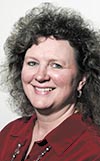Raise many questions, but do it responsibly

I grew up with an unending inquisitiveness that almost certainly drove my teachers, my parents and my big brother crazy.
I never blindly accepted things I was taught. Instead I always questioned how someone had drawn conclusions that were being taught to us.
That inquisitiveness led me to pursue a journalism career.
We ask questions, we dig for answers, and we don’t always accept what we are told. If a fact is independently verifiable, we do just that.
So that’s why sometimes I understand the public’s need for further confirmation on things they hear or read in the media. Since I’ve been questioning everything for so long, I understand why others also raise questions and test facts. And frankly, that’s just fine with me because if we, as journalists, are doing our jobs well, anyone who fact checks our work should find that our reporting is accurate. And if it’s not, reputable journalists should be willing to correct it.
The problem is that many people who shout “fake news!” or who raise legitimate questions often don’t seek answers using independent or reputable sources.
Unfortunately, they “fact check” by reading someone’s opinion blog or column. They are drawn into social media worlds offering one-sided posts without balance or reputable sources. Or they listen to pundits spewing opinions on 24-hour cable TV news networks and then think they are educated on a topic.
That’s frustrating for journalists who devote their lives to their craft only to be accused of spreading lies.
But that frustration must be only a tiny fraction of the horror and heartbreak experienced by devastated families mourning the violent deaths of their tiny children in a horrific 2012 school shooting. These families became the subject of relentless public criticism, torment and accusations that they were spreading fake news and concocting stories.
Twenty children aged 6 to 7 and six adults died in the mass shooting Dec. 14, 2012, at Sandy Hook Elementary in Newtown, Conn. Adam Lanza, 20, is the accused killer, who died by suicide at the scene. Lanza also earlier shot and killed his mother.
Sandy Hook was the deadliest mass shooting at an elementary school in U.S. history, and as expected, it set off renewed gun control debates.
Following the tragedy, conspiracy theorist Alex Jones, host of the far-right website Infowars and political talk show, publicly questioned whether the incident ever even happened. According to The Associated Press, Jones claimed the massacre was staged in a plot to take away people’s guns.
The publicity led to targeted threats, harassment and relentless torment to victims’ families by other conspiracy theorists. One man testified that conspiracy theorists urinated on the grave of his 7-year-old son and threatened to dig up his coffin.
Victims’ families sued Jones and his Infowars’ parent company, but the AP reports he failed to cooperate and did not turn over records that might have shown whether Infowars profited from knowingly spreading misinformation.
A judge ruled that Jones was liable for defamation, and last week, a jury ordered that Jones pay more than $900 million in damages.
Jones now acknowledges his conspiracy theories about the shooting were wrong, but says he isn’t to blame for the actions of people who harassed the families.
After the verdict was read, the AP reported that Jones said he never mentioned the plaintiffs by name. He called the court proceedings a “show trial” and added, “this is the left completely out of control.”
He also claimed it was a conspiracy by Democrats and media to silence him and put him out of business.
Jones’ lawyer, who has pledged to appeal, said, “Today is a very, very, very dark day for freedom of speech.”
Now, let me be clear. Unequivocally, I am an advocate for free speech. But in journalism and in life, we all learn that with free speech comes great responsibility.
Journalists, I believe, must be held to even higher standards because what we say has a reach, making it more impactful. In the newspaper business, credibility is the key to our success.
One plaintiff put it very well when he told the AP the verdict shows “the internet is not the wild, wild west, and that your actions have consequences.”
blinert@tribtoday.com


